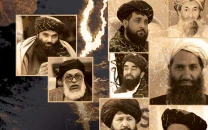Identifying the real enemy
There finally exists consensus that terrorism, dictatorship, illiteracy, diseases are real enemies of Pakistan.

The writer is Chief Executive of the Strengthening Participatory Organisation
The extremism enveloping the country today has its roots in the flawed foreign policy during the formative years of Pakistan. Britain had a long history of confronting communism in the subcontinent. Although British rulers quit this region in 1947, this did not obviate their paranoia of the possible creep of communism in the region. With India’s tilt towards Russia, Pakistan became the sole option to develop as a bulwark against the red scare. The red revolution in China augmented consternation in the United Kingdom and the United States. This prompted both countries to invest in the security apparatus of this country. The British government’s secretary of defence, in his note sent on May 3, 1949, mentioned the “value of Pakistan as a main base” and argued that “Pakistan is well situated to assist in defence or recapture of the Middle East Oil area and could provide airfields for the strategic bomber offensive”. In December 1950, the US Embassy, in its report “US Strategic Interest in Area”, endorsed the aforementioned views by recognising that Pakistan’s strategic location made it the ‘only logical base’ from which to launch an attack on the USSR. Militarisation of the country was initiated on ideological grounds. The ideology of Muslim nationhood was exploited to legitimise a formidable defence establishment that could make Pakistan an invincible citadel of Islam. Over 70 per cent of the country’s total revenue was thus allocated for defence in the first budget presented on February 28, 1948.
Pakistan gradually drifted into a theocratic state to shoulder the responsibility of forestalling pernicious communist advancement in the region. This arrangement had, perforce, to eulogise religion as a key state ingredient to determine all internal and external policies of the country. The Objectives Resolution was invoked as the preamble to the Constitution and formally converted the country into a theocratic state. Ayub Khan and Zulfikar Ali Bhutto capitulated before religious elements. Ayub embellished the country’s name with the term ‘Islamic’ in the erstwhile ‘Republic of Pakistan’. Bhutto went the extra mile by declaring Ahmadis non-Muslims, prohibiting liquor and making Friday a weekly holiday to pacify enraged clerics. Ziaul Haq casted the dye by elevating jihad from individual faith to state business. Zia, an ardent advocate of Islamisation, harvested the boon of the Afghan war.The Russian invasion of Afghanistan was the last straw on the back of the US and the West. Consequently, Pakistan was made a surrogate battleground against the Soviet Union. The US and the UK imputed the Soviet Union as the real threat to Islam and became guardians of the Islamic world. Pakistan’s security establishment, with its myopic policies, made the country a scapegoat for vested interests of superpowers. The episode turned Pakistan into a perennial playground of jihadi forces.
The country never realised its perilous drift into a hotbed of religiosity. This attained a pinnacle where girls’ schools are being blasted and polio vaccinators are being brutally killed. No civilised society can allow such barbarity in the name of faith. Completely converted into a security state, the country has abdicated its citizens and the security mania has taken the toll of human development. Today, a country with atomic bombs is unable to contain a simple outbreak of measles after pumping billions into vaccination drives, which has stigmatised the country in the international community. A belated realisation merits a paradigm shift that emphasises internal affairs in the whole array of national security. Remedial measures need a more realistic approach whereby citizens’ interests become the bedrock of the national security agenda. There finally exists a broader consensus that terrorism, dictatorships, injustice, poverty, illiteracy and diseases are real enemies of Pakistan.
Published in The Express Tribune, January 10th, 2013.












COMMENTS
Comments are moderated and generally will be posted if they are on-topic and not abusive.
For more information, please see our Comments FAQ